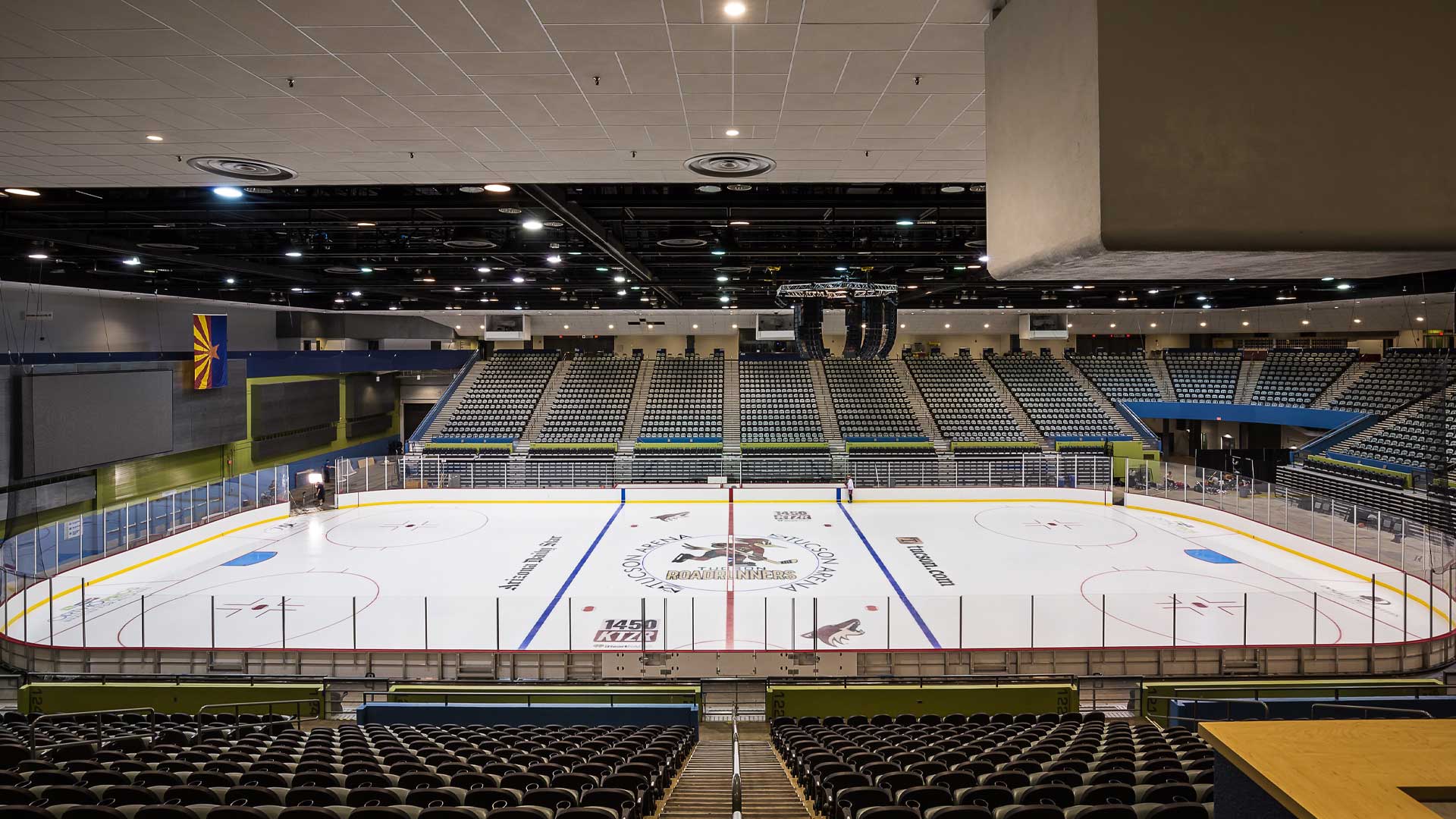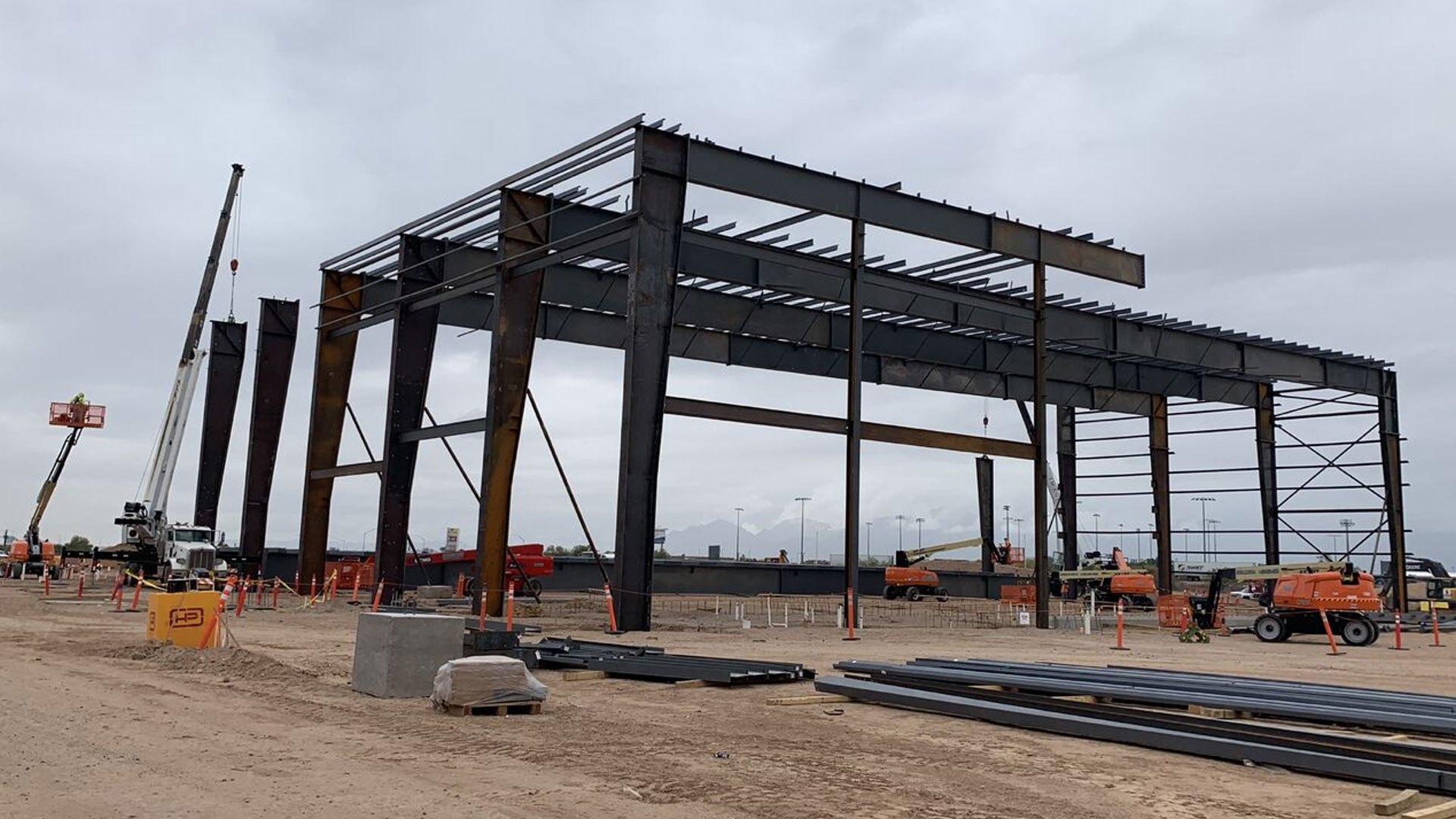 The Tucson Convention Center in downtown Tucson serve as the home of the Tucson Roadrunners and is the only ice rink in the city.
The Tucson Convention Center in downtown Tucson serve as the home of the Tucson Roadrunners and is the only ice rink in the city.
In the heart of the Sonoran Desert, a close-knit hockey community is proving that passion for the sport can thrive anywhere, even where frozen ponds are nowhere in sight.
This unlikely hockey scene didn’t grow by accident. It’s the result of years of local families and organizers fighting for more ice time and more opportunities to play, even when the climate says otherwise.
In Tucson, players, coaches and families are fueling a youth hockey boom that’s outpacing the city’s single sheet of ice, highlighting a statewide shortage of rinks.
“One of the biggest obstacles here is from a grassroots level,” said Rob Mattina, vice president of marketing for the minor league Tucson Roadrunners. “There’s one ice arena in all of Tucson. And you’ve got to get the kids involved, right? Because once the kids get involved at the grassroots level, you build them for the long-term future of the franchise.”
Growing up in Boston, Mattina says kids had plenty of options – whether it was organized hockey, street hockey or frozen ponds in winter.
“It’s kind of hard to play street hockey in Arizona in the summer when it’s 120 degrees out,” he said.
Yet the desert heat hasn’t stopped the sport’s momentum, and the demand for ice is bigger than ever, local hockey leaders say.
Keeping up with the growing interest has become a race against time and space. Families often juggle odd practice hours or travel long distances to find open ice, and they hope that new facilities will follow the wave of young players eager to learn the game.
Former Roadrunners captain Adam Cracknell knows that firsthand. He is spending the summer giving back to the community that packed the arena for him during his years of playing professionally.
“Hockey itself is growing as a sport, obviously, in these hot states, but Arizona is growing so much,” he said. “You look at Phoenix, and you see it’s picking up a lot here in Tucson, too. Just having more options, that’s why I’m back here for the summer, teaching kids hockey down here at the TCC. It’s been a lot of fun.”
Youth interest is surging, but the infrastructure is lagging.
Arizona has roughly 16 ice rinks, a small number for a fast-growing region – and in Tucson, the situation is even more limited. The only available rink in the city is the Tucson Convention Center, a multi-use facility that serves as the current home for public skating and organized hockey events. It’s where the Tucson Roadrunners junior program first took shape, growing from just 80 kids when the team arrived in 2016 to several hundred today.
But a major shift is on the horizon.
 Construction continues on the Mosaic Quarter, a new sports and entertainment destination that is part of the Kino Sports & Entertainment Complex. Photo taken June 2025.
Construction continues on the Mosaic Quarter, a new sports and entertainment destination that is part of the Kino Sports & Entertainment Complex. Photo taken June 2025.
Opening in the spring of 2027 as part of Phase I of the larger Mosaic Quarter development, the MQ Iceplex will become the epicenter of ice sports in southern Arizona. The facility will feature three ice rinks, including two community rinks and a 3,000-seat arena, along with 15 locker rooms, two party rooms, a pro shop and a team store. It’s designed to serve hockey, figure skating and a range of recreational ice activities, while also drawing in travel tournaments to help boost local economic development.
Operated under the University of Arizona’s Department of Campus Recreation, the Iceplex will also provide a space for student intramural hockey, broomball, open skates and other special campus events, making it a true hub for both the university and the broader Tucson community.
“The only reason we have to limit it is that we only have one sheet of ice,” said Bob Hoffman, the Roadrunners’ president and alternate governor.
“When the Coyotes came into Phoenix” in 1996 from Winnipeg, “that’s where hockey started to plant seeds and roots,” he said. More ice means more kids on skates—and more homegrown players who might one day follow in the footsteps of Arizona native Auston Matthews, now an NHL star.
The Roadrunners hope that by keeping kids on the ice, the region can continue to build a lasting hockey culture that spans generations, no frozen ponds required.
“It’s fun to watch,” Hoffman said. “It’s been great to see kids begin hockey as their first sport, not just a hobby.”
Even in the heat of the Arizona summer, the sport’s momentum is moving quickly—a testament to the community’s resilience and passion for hockey.
The NHL pulled out of Arizona last year when the Arizona Coyotes moved to Salt Lake City and became the Utah Hockey Club.
The move cast a shadow over professional hockey in Arizona, though the Tucson community remains supportive of the Roadrunners. Fans are excited for the upcoming American Hockey League season and still see the team as a rallying point to help hockey thrive in the desert.
Still, challenges remain without the visibility and resources the Coyotes once brought. Adding to the uncertainty, reports suggest the Roadrunners’ owner could move the team to Reno, Nevada, after two more seasons.
If Arizona loses its only professional hockey team, the youth programs that rely on its presence would struggle to keep momentum.


By submitting your comments, you hereby give AZPM the right to post your comments and potentially use them in any other form of media operated by this institution.